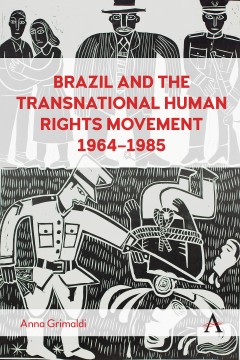Brazil and the Transnational Human Rights Movement, 1964-1985
By Anna Grimaldi
Other Formats Available:
- About This Book
- Reviews
- Author Information
- Series
- Table of Contents
- Links
- Podcasts
About This Book
Brazil and Transnational Human Rights Movement, 1964–1985 explores how solidarity for Brazil contributed to the global human rights movement of the 1970s. Through protests, petitions, posters, and numerous other cultural, artistic, and media-based campaigns, solidarity for Brazil popularised the language of human rights and prompted the international community to join the fight against the country’s military regime. But solidarity for Brazil also reframed the debate on human rights itself, stretching the concept beyond mainstream interpretations that emphasised the violation of ‘basic’ individual rights, such as the use of torture and political imprisonment, to also incorporate social and economic rights, inequality, indigenous minorities, and the human rights responsibilities of multinational companies and development projects. Crucial to this process were multiple networks of exiles, catholic activists, journalists, and academics between Brazil and Western Europe, who drew from the Latin American experience to challenge mainstream narratives of human rights from below.
Drawing from extensive archival research across Latin America and Europe, Grimaldi sheds new light on the transnational dimensions of political resistance to the Brazilian dictatorship of 1964–1985. The book demonstrates how, contrary to dominant narratives, human rights solidarity for Brazil was not limited to ensuring the freedom of political prisoners and putting an end to torture and disappearances. Finding themselves at odds with the liberal framework and justification for human rights advocacy popular at the time, Brazilians and their advocates took a distinctive approach by drawing from local experiences and critiquing global political and economic structures and transnational actors alike in violating human rights in Brazil. By bringing these debates to global audiences and to the doorstep of organisations like Amnesty International, the Vatican, and the United Nations, solidarity for Brazil did not simply remain on the fringes of debates about human rights; they actively shaped them.
Reviews
“Brazil and the Transnational Human Rights Movement is an inspiring study of global politics, resistance and solidarity. Challenging us to reconceptualise teleological top-down histories of human rights and consider pluralistic notions circulating among exiles and activists from the 1960s to the 1980s, it is an exciting call to rethink histories of the late twentieth century” — Tanya Harmer, Associate Professor, London School of Economics and Political Science, London, UK.
“Brazil and the Transnational Human Rights Movement, 1964-1985 is an important contribution to a still nascent field of research about the multiple ways Brazilians and international actors worked together to denounce the Brazilian military dictatorship and support the efforts for progressive social change in that country by focusing on the ways in which Brazilians and their European allies mobilized support with the strategy of isolating the regime and pressuring for a return to democratic rule” — James N. Green, Professor of Brazilian History and Culture, Brown University, Rhode Island, USA.
“Brazil and the Transnational Human Rights Movement, 1964-1985 makes an important contribution to our understanding of the evolution of human rights in the late twentieth century. It argues that Brazilian activists and exiles made vital contributions to the building of transnational human rights networks in the 1960s, 1970s and 1980s, moving the focus of these networks from a narrow engagement with civil and political rights to a broader understanding of the importance of so-called ‘third generation’ or social and economic rights, including collective rights. The book is based on interviews and painstaking research in Portuguese, Spanish, French, Italian, German and English-language archives. The book is an impressive contribution to scholarship on transnational human rights, Latin American politics and history, and relations between the Global South and Global North. It marks the debut of a promising young scholar, Anna Grimaldi, with an ability to interpret texts in subtle and surprising ways, showing how ideas change as they are transmitted across time and space. I highly recommend this book” – Anthony W. Pereira, Director of the Kimberly Green Latin American and Caribbean Center, Florida International University, Miami, USA.
Author Information
Anna Grimaldi is a lecturer in International Relations at the University of Leeds.
Series
Anthem Brazilian Studies
Table of Contents
Acronyms; Introduction; Chapter 1: Foundations of Solidarity 1964–1969; Chapter 2: Exile, Torture, and Disappearances 1969–1972; Chapter 3: Poverty, Inequality, and Transnational Responsibility 1973–1975; Chapter 4: Brazil and Latin America; Brazil and the Third World 1975–1985; Conclusion; Epilogue.
Links
Stay Updated
Information
Latest Tweets



